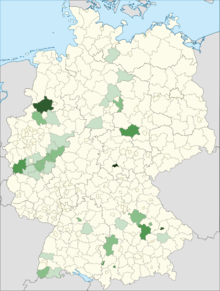Albanians in Germany
 Map of where the Albanian community (mainly from kosovo) is concentrated in Germany | |
| Total population | |
|---|---|
| 350,000[1] to 500,000 | |
| Regions with significant populations | |
| Berlin, Stuttgart, Hamburg, Munich | |
| Religion | |
| Muslim, Christian (Roman Catholic, Albanian Orthodox), Irreligion | |
| Related ethnic groups | |
| Albanians |
| Part of a series on |
| Albanians |
|---|
 |
| By country |
|
Native communities Albania · Kosovo Arbanasi · Arbëreshë Croatia · Greece · Macedonia · Montenegro · Serbia Albanian diaspora Australia · Bulgaria · Egypt Germany · Italy · Romania · Sweden · Switzerland · Turkey · Ukraine · United Kingdom · United States |
Approximately 350,000 to 500,000[1] ethnic Albanians live in Germany. They migrated to Germany from Albania, Kosovo and the Republic of Macedonia.
History
The first Albanian immigration wave to Germany began in 1968; they moved as guest workers and worked mainly in the industry. They were usually regarded as Yugoslavs and not as Albanians, because they came from Kosovo, which at that time belonged to Yugoslavia. Due to the political situation in Kosovo, more and more Albanians arrived since the beginning of the 1980s.
During the Kosovo war in 1999, many Kosovo Albanians sought asylum in the Federal Republic of Germany. By the end of 1999, the number of Kosovo Albanians in Germany was about 480,000, about 100,000 had returned voluntarily after the war in their homeland or been forcibly removed.
Migration situation
According to German Mikrozensus data there were 323.000 migrants from Kosovo and 70.000 foreigners with Albanian nationality living in Germany at the end of 2015. There are also Albanians among the migrants from the Republic of Macedonia in Germany. But official data say nothing aboout the ethnic background. Currently, the cities with the largest population of Germans of Albanian descent are the metropolitan regions of Berlin, Hamburg, Munich and Stuttgart. In Berlin in 1999, there were about 25,000 Albanians, the number dropped because of remigration and Germany's general population decline. It is quite hard to know the true number of Albanians in Germany, as they were defined as Yugoslavs or Macedonians when they came to Germany. There is also a significant number of Albanians from Kosovo and Macedonia living in Germany illegally. So an exact number of the population with Albanian descent in the Federal Republic of Germany can hardly bei given. Germany is the most popular destination for Kosovar Albanians seeking to emigrate to Western Europe.
Famous Albanians in Germany
Politicians
- Zana Ramadani, German politician, feminist activist and author
Cinema
- Gedeon Burkhard - German film and television actor
- Heinrich Schmieder - German actor
- Nur Fettahoğlu - Turkish-German actress
Entertainment
- Miriam Cani - singer, member of Preluders
- Blerim Destani - actor and film producer
- Bettina Moissi - German stage and film actress
- Ardian Bujupi - singer, DSDS contestant[2]
- Colos - rapper
- Azet - rapper
Sports
- Fatmire Bajramaj, commonly known as Lira Bajramaj, footballer of the German women's national football team
- Shkodran Mustafi, footballer, currently playing for Arsenal F.C. the German national football team
- Luan Krasniqi, boxer[3][4]
- Jürgen Gjasula, footballer, currently playing for SpVgg Greuther Fürth and the Albania national football team
- Mërgim Mavraj, footballer, currently playing for Hamburger SV and the Albania national football team
- Valdet Rama, footballer, currently playing for Yanbian Funde F.C.
- Bajram Sadrijaj, footballer, currently retired due to injury, last played for Borussia Dortmund
- Faton Toski, footballer[5]
- Donis Avdijaj, footballer, currently playing for Schalke 04 and the Kosovo national football team
- Alban Meha, footballer
- Valentina Limani, Kosovo Albanian professional footballer
- Mërgim Berisha, Kosovo Albanian professional footballer who plays as a forward for German club 1. FC Magdeburg,
- Enis Bunjaki, professional footballer
- Arianit Ferati, professional footballer
- Ali Ibrahimaj, German footballer who plays as a midfielder for KFC Uerdingen 05
- Agim Zeka, Albanian professional footballer who plays as a right winger for Portuguese club Varzim on loan from French club Lille
- Meritan Shabani, German footballer who plays as an attacking midfielder for Bayern Munich
- Valmir Sulejmani, German-Albanian footballer
- Leart Paqarada, German-Albanian footballer
- Florent Muslija, German-Albanian footballer who plays as a midfielder for Hannover 96
- Besar Halimi, German-Albanian footballer
Business and civil society
- Nicolas Berggruen, philanthropist and investor
See also
References
- 1 2 Hans-Peter Bartels: Deutscher Bundestag - 16. Wahlperiode - 166. Sitzung. Berlin, Donnerstag, den 5. Juni 2008 Archived January 3, 2013, at the Wayback Machine.
- ↑ "{title}". Archived from the original on 2011-02-23. Retrieved 2011-04-30.
- ↑ "BoxRec: Luan Krasniqi". Boxrec.com. Retrieved 28 August 2017.
- ↑ "Luan Krasniqi". Luankrasniqi.blospot.com. Retrieved 28 August 2017.
- ↑ "Archived copy". Archived from the original on 2014-02-04. Retrieved 2016-08-30.